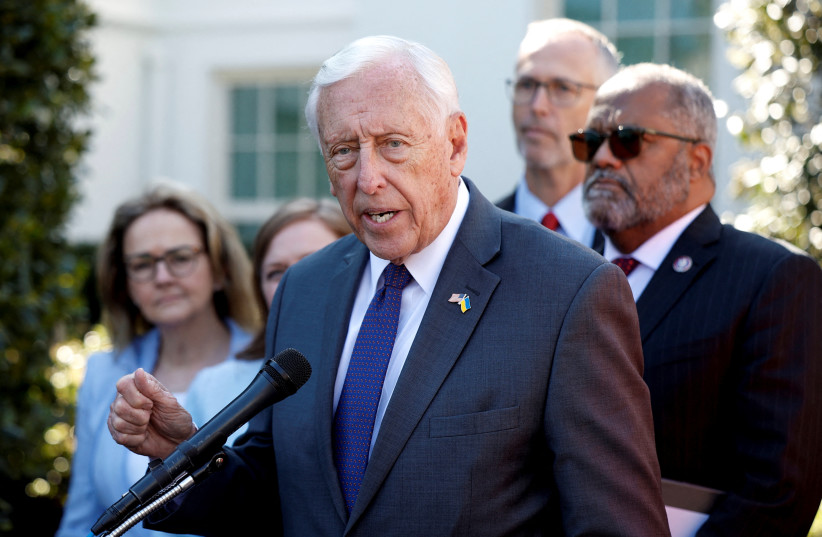Payoff in US-Iran prisoner release incentivizes kidnappings, terror – Rep. Hoyer
The release of $6 billion in frozen assets as part of a prisoner release deal with Iran encourages Tehran to abduct more Americans, Rep. Steny Hoyer (D-Maryland) warned on Friday, at the end of an AIPAC-organized visit to Israel with 24 freshman Democrats.
A day earlier, the US and Iran announced the release of five Americans from Iranian prisons in exchange for five Iranians in American jails, along with allowing Iran to access funds frozen in South Korea for humanitarian needs, such as food and medicine.
“This is a substantial amount of money for Iran, which has used money historically for damaging purposes, not only for the Middle East, but more broadly and particularly [against] Israel for support for terrorism,” Hoyer said.
Rep. Hoyer warns of ‘kidnappings and shakedowns’
While welcoming the end of the plight of the Americans taken prisoner by Iran, the congressman expressed concern that the deal may encourage further “kidnappings and shakedowns.”
“I want more facts, because generally these transactions make me concerned,” he stated. “We generally have a policy not to do this. It’s hard to think that it does not incentivize criminal activities to profit from them.”
Hoyer also said he expects the Biden administration to report the details of the deal to Congress.
 Representative Steny Hoyer (D-MD) speaks to the media alongside fellow Democratic members of Congress, following a meeting at the White House in Washington, US, March 30, 2023 (credit: REUTERS/EVELYN HOCKSTEIN)
Representative Steny Hoyer (D-MD) speaks to the media alongside fellow Democratic members of Congress, following a meeting at the White House in Washington, US, March 30, 2023 (credit: REUTERS/EVELYN HOCKSTEIN)Israeli officials have expressed concern that the prisoner release could be part of a broader deal limiting Iran’s uranium enrichment, since both were part of negotiations that took place in May and June.
Hoyer, who met with Prime Minister Benjamin Netanyahu and other senior Israeli officials during his visit this week, said that “there is careful consideration of this by some in Israel in the sense that they want to know what’s on the table.”
“Netanyahu made clear that a nuclear-armed Iran is not possible and a deal that allows Iran in any way the pursuit of nuclear arms is unacceptable, which is essentially what we said as well, though the JCPOA [2015 nuclear deal] did not say that,” Hoyer said.
Still, he said that if the Iranians could agree not to further enrich, that would be a positive, depending on what Tehran expects in return.
“We have to stop Iran from becoming a nuclear weapon nation. They have shown that they are continuously inclined to use international criminal efforts to get their way and are looking for hegemony in the Middle East,” he stated.
“We have to stop Iran from becoming a nuclear weapon nation”
Rep. Steny Hoyer (D-Maryland)
Saudi Arabia, Egypt could also pursue nuclear weapons
Hoyer also said Iran advancing its nuclear program could lead Saudi Arabia and Egypt to pursue nuclear weapons programs to defend themselves from Iran.
In that vein, Hoyer said he shared skepticism with his Israeli interlocutors about Saudi Arabia’s intentions for the civilian nuclear program it has asked the US to help it develop in the framework of a normalization deal with Israel.
“The Saudi interest in peaceful nuclear energy seems to be redundant in light of their extraordinary [oil resources], and therefore, to be suspect. What they really want is to develop a nuclear defense response to Iran’s malevolent behavior,” Hoyer said.
“All the Israeli officials I talked to on this trip are concerned for exactly this reason,” he added. “All Israeli officials across the spectrum – coalition, opposition – that position was pretty uniform.”
Regarding how the judicial reform debate would impact the US-Israel relationship, in light of recent statements by US President Joe Biden calling to slow down the process and reach a consensus, Hoyer said that “the relationship between us and Israel being strong is in part based upon share values…One of our values is the separation of powers and checks and balances on the organs of government.”
At the same time, Hoyer said the relationship is also “based significantly on our own security…Israel is a critical component of America’s national security.”
Hoyer said he has head firsthand the “strong feelings” of people on both sides of the debate.
Opposition leader Yair Lapid is “very concerned, as are many others that [the overhaul] will change the nature of Israeli democracy in terms of checks and balances to make sure that one branch of government doesn’t become authoritarian,” Hoyer said, following a meeting with Lapid.
Hoyer dismissed worries about the anti-Israel positions of the left flank of the Democratic party.
“On issues of antisemitism, support of Israel’s security, for additional funding for the Iron Dome, supporting tech for the Iron Beam [laser defense system] and other defensive measures that we think Israel needs, we get over 400 of 435 votes in Congress,” Hoyer said. “In that context, Israel continues to enjoy overwhelming bipartisan support.”
At the same time, there will always be “other perspectives” in a democracy, he said.
“Consistently, whether Republicans or Democrats are in charge, even now when Congress is almost evenly split, Israel gets over 400 votes. Should Israel be concerned? I say Israel still enjoys strong bipartisan support,” Hoyer stated.





Comments are closed.